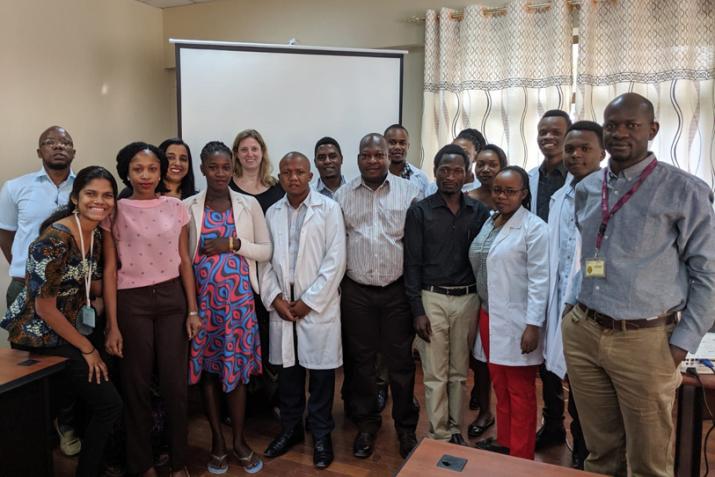
Yadurshini Raveendran (front row, far left) stands with the clinicians and study team at Bugando Medical Centre as they celebrate the launch of the mNavigator mobile application. The app functions as a portable electronic health record for pediatric patients that incorporates standardized treatment protocols for Burkett Lymphoma and Retinoblastoma with the goal of improving compliance with these standardized treatment protocols and improve treatment adherence, thus improving survival rates for pediatric cancer. The Duke study team—including Raveendran and Drs. Kristin Schroeder and Lavanya Vasudevan—led the launch.
Published August 5, 2019, last updated on June 3, 2020 under Voices of DGHI
Every summer, global health students at Duke University travel to countries around the world to do field research in a variety of topics within global health—including environmental health, women’s reproductive health, infectious disease, health policy and more.
DGHI caught up with Master of Science in Global Health student Yadurshini Raveendran to learn more about her field research in Mwanza, Tanzania with mentor Dr. Kristin Schroeder, assistant professor of pediatrics and global health at Duke. Raveendran is working on assessing the barriers to good nutrition for pediatric oncology patients at Bugando Medical Centre and promoting education and interventions to encourage good nutrition and, in turn, treatment outcomes. She also has a second project with Schroeder and Dr. Lavanya Vasudevan, assistant professor of family medicine and community health and assistant research professor of global health at Duke.
DGHI: What inspired you to pursue THIS project?
Raveendran: What I enjoy the most about being in global health is the multi-disciplinary nature of it. It never gets boring, and it never fails to surprise me with exactly how many different things make up the sphere that is global health. I was drawn to this project for two reasons. First, having worked in research with children before, I was thrilled to continue my work with pediatric patients, and second, I’ve always been interested in the intersection between healthcare and technology, so this project incorporating digital health was a challenge that I was thrilled to take up! I’m excited to upscale this nationally and beyond sometime in the future.
DGHI: What’s the best piece of advice you got when preparing for your fieldwork?
Raveendran: Keep an open mind! I think keeping this motto as the foundation for my adventures here in Mwanza has led to a wonderful time here both in office and outside. I’ve gotten the chance to travel to new places, had discussions with amazing people from all around the world and experienced some incredible once-in-lifetime opportunities.
DGHI: What’s the biggest challenge you’ve overcome during your fieldwork?
Raveendram: The greatest challenge for me has been the reality that is cancer. Over the last 10 weeks or so, I’ve been getting to know and making emotional attachments with the children here only to realize later on that some are on palliative care. It’s been a struggle coming to terms with that fact, and I don’t think I’ve overcome that challenge. I think I’ve been learning to look at the positive and make sure that I can make them as happy and as comfortable as possible for the time they have left.


